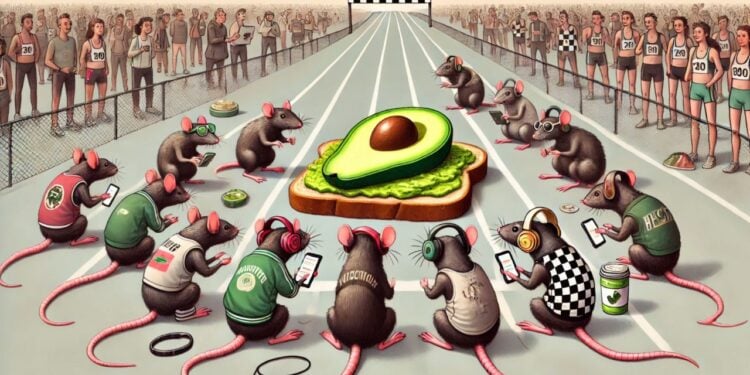- Millennials are abandoning high-stress corporate positions and pursuing work that values personal fulfillment over outdated notions of professional success.
- This transition is motivated by a desire for authenticity, a balanced work-life dynamic (with autonomy), and the aspiration to enact positive environmental and societal changes.
- Millennials’ disillusionment with capitalism has reshaped their perception of the future of work, leading to a rejection of traditional workplace structures and a focus on self-reliance.
While AI is making big waves changing the workplace rapidly, one monumental shift in the future of work is happening much more slowly. Millennials now make up the majority of the workforce, and will remain the largest generation at work for nearly 20 more years. The shifts this demographic is making now, and the work-life balance they are modeling for younger generations, will leave a lasting imprint.
Millennials are on a mission to exit the rat race. If the world of work they shape isn’t a relentless pursuit of success, what will it be?
What’s Behind Their Shifting Priorities?
At the stage of their careers traditionally associated with homeownership and wealth accumulation, Millennials found their career trajectories disrupted by the pandemic. They now face mounting financial challenges — including a cost-of-living crisis and the third recession of their lifetimes.
Millennials are subsequently redefining their priorities for the future of work in response to these economic challenges and growing disillusionment with traditional career paths.
A recent Guardian article spotlights a significant lifestyle shift prioritizing personal happiness and fulfillment over the relentless pursuit of professional success. This shift is embodied by Millennials who have chosen to abandon successful corporate careers in favor of what has been termed the “soft life.”
Millennial Gabrielle Judge (the Anti-Work Girlboss) and Abadesi Osunsade, CEO of Hustle Crew, have emerged as leading voices promoting this trend. They stress the importance of establishing boundaries, prioritizing self-care, and reassessing societal expectations surrounding work.
The pursuit of a more flexible work-life balance reflects a growing disillusionment with the traditional 9-5 work ethic and challenges the notion that hard work always guarantees success.
A recent article by Allwork.Space underscores this trend, revealing the mental health challenges faced by Gen Z and young millennial workers in the U.K. Research from Vitality reveals that this demographic loses approximately one workday per week due to mental health issues, amounting to around 60 productive days annually and causing significant financial losses estimated at £138 billion for the British economy.
The research also highlights elevated levels of depression, burnout, fatigue, and workplace loneliness among younger workers. These challenges, compounded by stagnant wages and unaffordable housing, prompt Millennials to reassess their career priorities.
As a result, Millennials are leading the charge for a four-day workweek and advocating for a more holistic approach to work-life balance, challenging outdated notions of work success.
Four Core Desires Encouraging Millennials to Escape the Rat Race
The decision to reject consumerism, excessive workloads and stressful corporate jobs can be attributed to a multitude of factors:
- The Desire for Authenticity: Many Millennials find themselves at odds with the pursuit of material possessions, instead valuing authenticity and personal growth. For millennials, success at work is often shaped by their core values.
- The Need to Reclaim Time and Freedom: The relentless pursuit of career advancement and material wealth often impacts wellbeing and work-life balance. Millennials prioritize their time and freedom, recognizing that genuine success encompasses a balanced life beyond the confines of a traditional nine-to-five grind.
- The Aspiration to Make an Environmental and Societal Impact: Concerns about the environment, climate change, and social justice encourage Millennials to adopt a less-consumerist lifestyle. They seek to minimize their ecological footprint and contribute positively to society, prioritizing sustainability over unchecked consumption.
- The Preference for a Minimalist Lifestyle: In response to the excesses of consumer culture, Millennials are embracing minimalism. By prioritizing life’s essentials, they seek to diminish stress and foster a sense of purpose and fulfillment.
Younger Generations are Reprioritizing and Reimagining the Concept of Work
Millennials are challenging societal norms, advocating for a more holistic definition of workplace success and fulfillment that prioritizes wellbeing, work-life balance, purpose, and societal impact over traditional markers of success such as job titles and material wealth. By rejecting consumerism and burnout, they are reshaping the workplace landscape and paving the way for more sustainable and fulfilling careers in the future of work.
Gen Z employees are also challenging traditional work norms, as evidenced by a recent debate sparked by actress Jodie Foster, who suggested that Gen Z lacks a “professional” work ethic. While some sectors of the population agreed with Ms Foster, others voiced support for Gen Z’s prioritization of work-life balance — reflecting generational differences in attitudes towards work and the meaning of success.
These shifting attitudes and motivations among younger generations of workers signify a move towards valuing personal wellbeing and autonomy. Understanding and navigating these generational differences will be pivotal in shaping the future of work.
Key Takeaways for Employers
Millennials have become disillusioned with capitalism, intensified by economic downturns and subsequent job insecurity. This disillusionment significantly influences how younger workers view employment, heralding a shift in perspective that will impact future workplace dynamics and attitudes toward career advancement.
Experiences of economic crises and perceived failures of institutions to provide security have eroded Millennials’ trust in traditional workplace structures. This skepticism towards managerial loyalty and organizational stability could lead to increased job mobility and more focus on self-reliance.
Experiences of economic crises and perceived failures of institutions to provide security have eroded Millennials’ trust in traditional workplace structures.
Workplace stressors (such as excessive workloads and long hours) have led to the proliferation of alternative arrangements such as freelancing, entrepreneurship, and work in the gig economy, as younger workers seek greater flexibility and autonomy.
There are also generational differences in optimism regarding job security and career progression. Recent data revealed by Allwork.Space indicates that Gen Z is more optimistic about their job prospects, with 73% expressing positivity. While Millennials exhibit lower levels of optimism, they are more inclined towards change, with 61% considering a career shift. These insights are pivotal for shaping future recruitment strategies and fostering workplace culture. Additionally, younger workers are leading a burgeoning demand for transparency and equitable treatment within organizations. Companies that prioritize Corporate Social Responsibility and uphold the values of equality and fairness are perceived more positively by Millennials.
The experiences and perspectives of Millennials regarding work and career expectations offer valuable insights into the evolving nature of work in the 21st century. Understanding the factors affecting and influencing this cohort can inform employer strategies, facilitating more inclusive, equitable, and fulfilling workplaces.

















